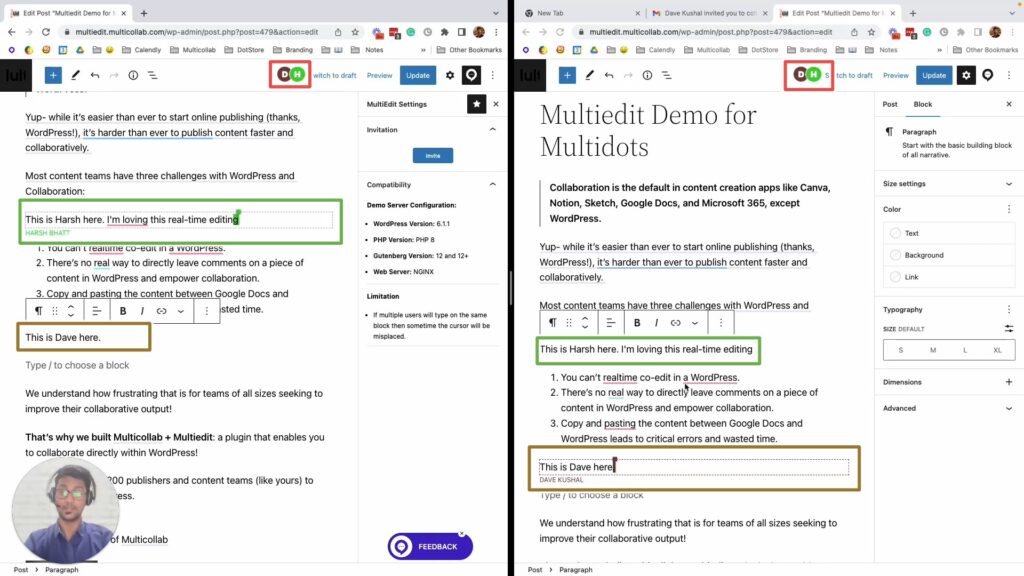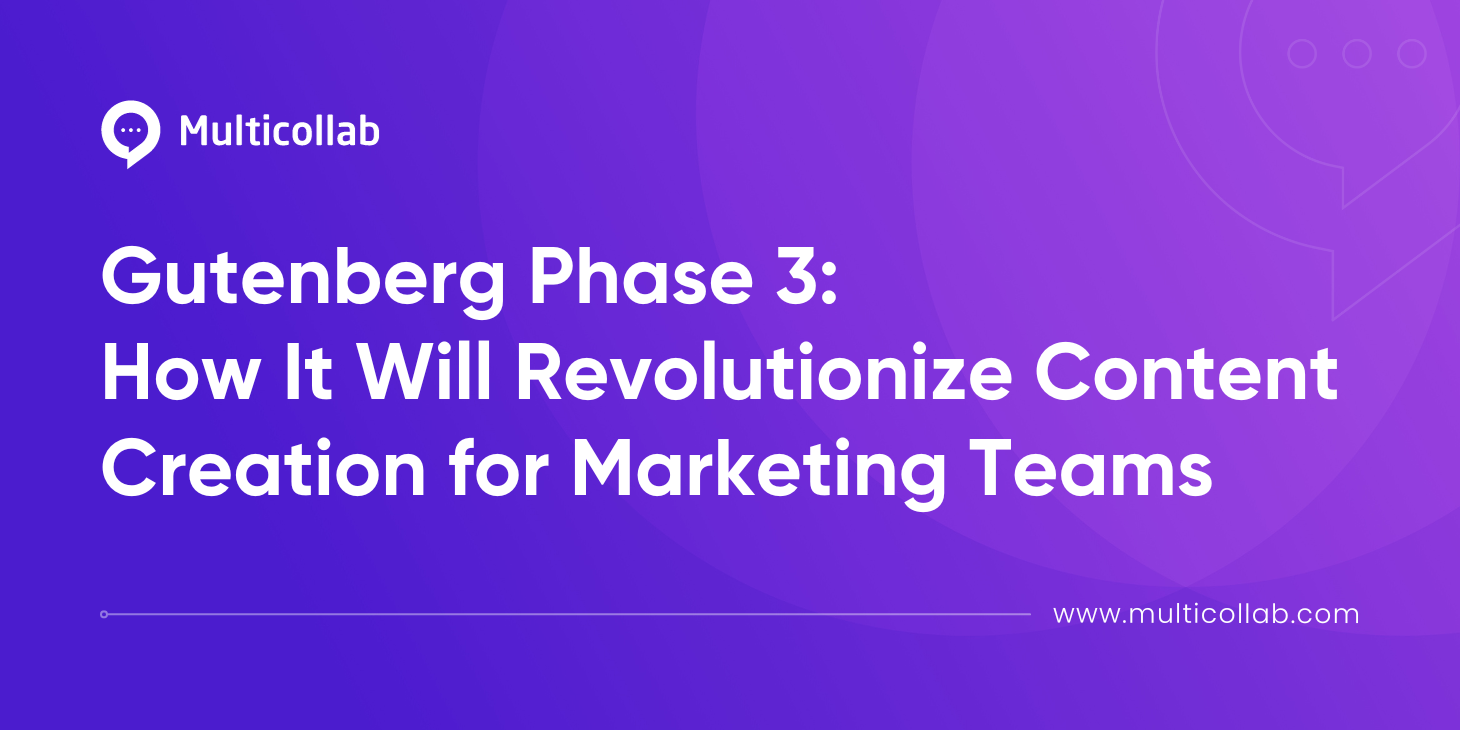Table of Contents
Gutenberg Phase 3, one of the most anticipated updates to WordPress Gutenberg Editor, aims to enhance the workflow of your marketing team.
With its focus on real-time collaboration, the Gutenberg Phase 3 update allows your marketing team members including authors, editors, publishers, content managers, clients, and external stakeholders to collaborate without ever leaving the WordPress website.
In this article, let’s take a closer look at this update of the Gutenberg Editor and the impact it could have on the content production workflows of WordPress content marketing teams.
Understanding WordPress Gutenberg Phase 3
The Gutenberg Project was started to deliver a world-class site editing experience to WordPress teams. Phase 1, released in 2018, allowed users to create blog posts and pages with a brand-new WordPress block editor. To give marketing teams more creative freedom, Phase 2 of the Gutenberg project, released a year later, enables full site editing and more customization of designs.
The Gutenberg Phase 3 aims to empower WordPress marketing teams even further by bringing real-time collaborative features to its block editor that enable users to communicate with their team members and external stakeholders as they do in third-party content creation tools like Google Docs.
This means your marketing team can create, edit, and customize web pages and posts simultaneously to make your WordPress content production workflow more efficient and collaborative than ever before.
Furthermore, since the Gutenberg block Editor is a blog editor, you can exchange feedback on multimedia content such as videos and dynamic blocks (CTA boxes, image carousels, etc.) just as you do with text-based content.
Let’s dive a bit deeper to uncover how these new functionalities of your Gutenberg Editor will improve your marketing team’s workflows.
Gutenberg Phase 3: Benefits of WordPress Block Editor for Marketing Teams
The collaborative editing features of Gutenberg Phase 3 will change the WordPress content creation workflow as we know it. For marketing teams, it brings three distinct benefits to their WordPress site.
1. Collaborate with a Blog Editor
Content teams, for the most part, rely on third-party text editing tools such as Dropbox Paper and Microsoft Word. However, since they are not blog editors, exchanging feedback on multimedia content such as videos and image carousels is not possible.
Marketing teams have to rely on traditional review methods such as emails and video calls to gather feedback on content that isn’t supported by these text editors.
Additionally, there could be a lot of back and forth with the content, particularly if there are multiple review phases, and each time you paste content on the blog editor from these text editing apps, you might need to redo the formatting.
All these challenges, which make the content production process slow and frustrating, will be a thing of the past with Gutenberg Phase 3. Marketing teams can gather feedback on all content types from multiple sources at the same time without leaving the Gutenberg block Editor.
2. Streamline the Editorial Workflow
The WordPress editorial workflow helps marketing teams enhance the quality of their content through peer and stakeholder review which allows them to deliver value to their readers while achieving business objectives.
As we mentioned briefly earlier, conducting peer and stakeholder reviews, particularly through multiple review cycles for multiple content pieces, on third-party content collaboration tools is time-consuming and frustrating.
This makes it challenging for content teams to produce content pieces quickly, which is essential when you want to write about a particular trending topic in your domain.
With Gutenberg WordPress block editor and its collaborative features, marketing teams can run the entire editorial workflow from start to finish without ever leaving the WordPress Editor. This will not only allow them to produce content faster but also will reduce operational costs.
3. Protect Organizational Files and Folders
Conducting a review in third-party content collaboration tools requires you to give unrestricted access to various team members and, most importantly, external stakeholders. Although the software used in these cases is safe, it still makes your organizational data vulnerable.
For instance, while sharing folders with external teams, you might make the mistake of sharing the wrong file within those folders.
Furthermore, external teams might request you to make data accessible to their tools through various APIs which, at the least, increases the number of access points to your data.
Marketing teams need to monitor the editing history of various documents and access permissions of their organizational files to ensure each edit is accounted for. This simply increases their workload while keeping their output the same.
Phase 3 of the development of the Gutenberg WordPress Editor eliminates the need for that by allowing you to invite external stakeholders to share their feedback directly on the WordPress platform. Marketing teams can also easily manage the permissions of various team members, clients, reviewers, etc., of posts and pages in bulk on their WordPress sites.
Gutenberg Block Editor: Experience Phase 3 Now
According to Matias Ventura, the lead architect of the Gutenberg Project, Phase 3 is still in its planning phase, and the functionalities within it will be available for the users after WordPress 6.3 update which is scheduled for later this year (2023).
This means WordPress marketing teams will still have to manage their existing workflow and deal with collaborative challenges such as:
- Dependency on third-party content collaboration tools
- The back-and-forth of content during the review phase
- Increased vulnerability of the organizational data
Fortunately, there is a solution.
Multicollab, a real-time WordPress collaboration plugin, allows you to co-edit posts and pages directly on the WordPress blocks of the Gutenberg Editor:

Multicollab is built to be compatible with the following Gutenberg blocks:
- Paragraph Block
- List Block
- Table Block
- Headings Block
- Quote Block
- Pullquote Block
- Verse Block
- Button Block
The following blocks are also enabled for collaboration with Multicollab PRO:
- Image Block
- Gallery Block
- Cover Block
- Audio Block
- File Block
- Video Block
- Media & Text
Skip the waiting line and get started today – click the link to experience all Multicollab features with a 14-day free trial here.
FAQs
1. Does WordPress still use Gutenberg?
Yes, WordPress still uses Gutenberg. Gutenberg is the default block editor introduced in WordPress 5.0 and continues to be used in the latest versions of WordPress.
2. What are the cons of Gutenberg WordPress?
The cons of Gutenberg WordPress include a learning curve for users accustomed to the classic editor, potential compatibility issues with certain themes or plugins, and initial challenges with the editing experience.
3. How do I create a blog page on WordPress Gutenberg?
To create a blog page on WordPress Gutenberg, simply create a new page, select the “Posts” block from the block library, and customize it with the desired blog settings and content.
4. Is Gutenberg the same as WordPress?
Gutenberg is the default block editor built inside WordPress. It is not a separate software or platform but an integral part of WordPress that has replaced the classic editor for content creation and editing.






